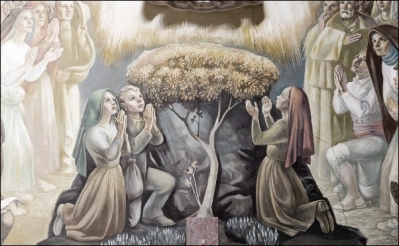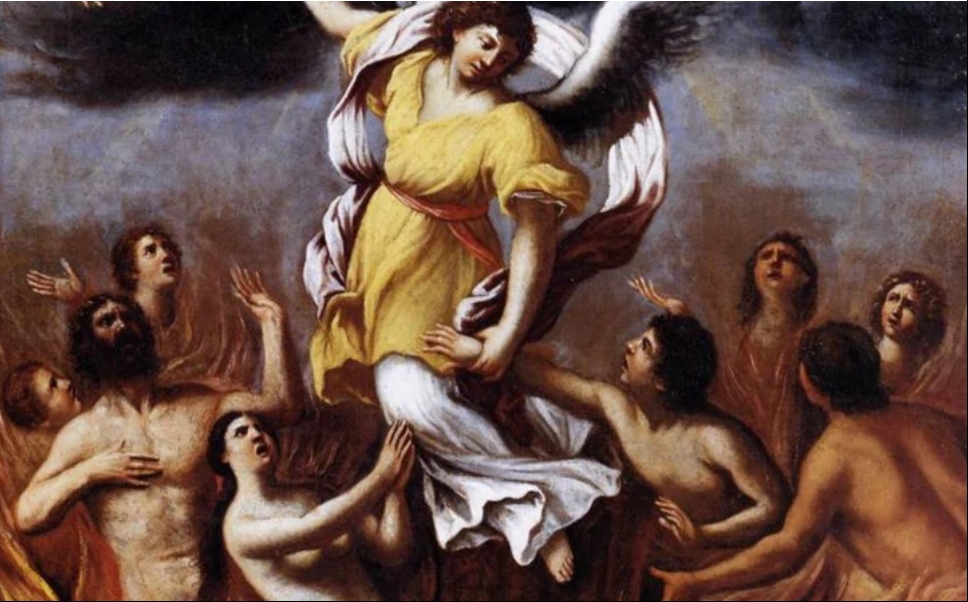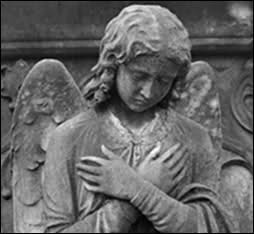O Most Holy Virgin, Mother of our Lord Jesus Christ, Our Lady of La Salette

Pray for priests that they may be imitators of thy son, Our Lord Jesus Christ.
Pray that the Lord may send us many holy priests.
Our Lady of La Salette, restore the Holy Church to all things in Christ.
Disappearance of Men

“Is not ours an age of mislived lives, of unmanned men? Why?… Because Jesus Christ has disappeared. Wherever the people are true Christians, there are men to be found in large numbers, but everywhere and always, if Christianity wilts, the men wilt. Look closely, they are no longer men but shadows of men. Thus, what do you hear on all sides today? The world is dwindling away, for lack of men; the nations are perishing for scarcity of men, for the rareness of men…
“I believe: there are no men where there is no character; there is no character where there are no principles, doctrines, stands taken; there are no stands taken, no doctrines, no principles, where there is no religious faith and, consequently, no religion of society. Do what you will: only from God you will get men.” (Cardinal Louis-Edouard Pie, Bishop of Poitiers, Homily for Christmas 1871)
We are living in the age of wilted men. Men today are bereft of faith and reason, virtue and character, honor and dignity. Men are empty vessels because the enemy has emptied them of the Catholic Faith. Progressivism has cultivated limp daffodils where once were virile men. It has replaced man with a curious species whose voice has been reduced to whimpers and sobs, a character more fitted to caricature than living and fighting against a world surrendering to Satan.
The heroic Bishop of Poitiers, Card. Pie, said that we have “unmanned men” because Jesus Christ has disappeared. Christ has disappeared because He has been shown the door in our society and the Conciliar Church, the wicked institution that claims Catholicity but is instead the diabolical deception resulting from the evils of Vatican II and the progressivist assault preceding it.
C.S. Lewis wrote The Abolition of Man in 1943 during the slaughter of the Second War against Western Civilization. In the chapter, ‘Men without Chests,’ he presciently wrote this, still pertinent today:
“And all the time – such is the tragi-comedy of our situation – we continue to clamor for those very qualities we are rendering impossible. You can hardly open a periodical without coming across the statement that what our civilization needs is more ‘drive’, or dynamism, or self-sacrifice, or ‘creativity’. In a sort of ghastly simplicity, we remove the organ and demand the function. We make men without chests and expect of them virtue and enterprise. We laugh at honor and are shocked to find traitors in our midst. We castrate and bid the geldings be fruitful.”
With this brilliant text, C.S. Lewis met his peer Card. Pie.
In his work Revolution and Counter-Revolution, Prof. Plinio de Correa Oliveira said, “In times of great crisis there are two types of men: those who are overwhelmed by the crisis and those who rise up to resist the trend of events and so change the course of History.”
Our times call for manned men, men with chests, and those who rise to resist events to change the course of History. The Church needs men, the revitalized Church Militant on the move to resist and fight the enemies in the world. Instead, that revolutionary Conciliar Church promotes the Church Groveling, men overwhelmed by crisis, men who promote the crisis. It is a “church” of darkness, a “church” of unmanned men. We need the army of Church Militant to rise against the enemy’s occupation of our Church and society.
But before we return to this matter, let’s look at how we have descended to such a state where men are no longer men.
Feminism vs. patriarchal society
In the 1962 pamphlet What’s Become of Father? Catholic scholar John O’Brien reports that the “problem” of the father and his role was troublesome even then. We mistakenly think of the ‘50s and ‘60s nostalgically as “good” times for the Church, the family and men. He is wrong. The assault against all three was already in full swing.
O’Brien wrote: “Time was when father was the revered head of the household, to whom the children turned for guidance in all important decisions; he was respected for his wisdom and experience, and loved for his devotion to his family. No event in the home was complete without his presence.” Such a vaunted position in the natural order of the family drove the fringe element of feminism into a ravening rage.
These harridans screamed in the streets, sharpening their tongues and knives, then went after men with a vengeance. They hated the “patriarchal” society. They vowed to destroy it. With millions of dollars pumped into academic programs called “Women’s Studies” in the nation’s colleges and universities, feminists rose to dominance. These “studies” were funded in great measure by the Rockefeller Foundation.
With the rise of feminism and women in the workplace, many women lost their natural loving instincts. Consequently, the family fell into disarray, morals declined and birth rates plummeted.” O’Brien suggests this is the case because, even in 1962, “the child’s chief, if not his only parent, is the mother, while the father is relegated to the position of a mere breadwinner.” Since then the father has ceased even to be the breadwinner and has become merely an inconsequential oaf, as countless advertising spots remind us.
Already in the early 1960s, commentators remarked on the father’s haplessness. Dr. O’Brien cites research affirming how modern culture set the woman up as a beautiful powerhouse of sex appeal and dynamic capability, relegating the male to a position of ridicule as an awkward and hapless galoot.
Reflecting the feminist vision of the male, the popular soap operas of that time pictured men as “simple-minded, easily-bamboozled and fairly expendable oafs.” In the halcyon days of television sit coms in the late ‘50s and early ‘60s, the trend toward oafishness began with Dick van Dyke’s character of Rob Petrie in The Dick van Dyke Show.
As society continued its unabated descent into filth and despair, more “fathers” appeared on the television horizon. Some fathers were still portrayed as adequate, The Andy Griffith Show and The Courtship of Eddie’s Father being two examples of note. But families were changing significantly with wives as co-breadwinners, usually in high powered jobs, like Claire Huxtable in The Cosby Show, where she was an attorney and he, Cliff Huxtable, a pediatrician working from the basement in his home.
The descent of the father continued with Home Improvement, showcasing Tim Allen as a ridiculous handy man wannabee who ran an unsuccessful cable network show. Allen was saved continually by his wife. If it were not for her, the show implied, Taylor and his three sons would be living in filth, reeking of perpetual body odor, wearing cardboard boxes for shoes and garbage bags as clothes.
In Home Improvement the mother’s true role as her husband’s helpmate and “sun of the family” has become a caricature. Men are seen as pigs that need women to clean them up and boss them around. That reinforces the twisted feminized view.
Anyone who watches sit coms today can see that this early tendency to present men as big boys and fools has continued and exacerbated without restraints.
There is no doubt that the great majority of modern men have been hermetically sealed in the baggie of feminism. Nearly all are too timid and fretful to break free to demand their natural authority as men and as heads of households.
Abandoning comforts and entering the battle
For the Church, true men are vital for her restoration. Sadly, even traditional Catholic men have been too inculturated by the filth of Progressivism. Men have become weak and ineffectual.
We must remember the words of Job, (7.i), “the life of man upon earth is a warfare.” We are seduced by comfort and consumption, beset by economic woes and the vagaries of antichrists in politics.
This is not the hour to abandon the Mystical Body of Christ to its enemies and run off to some solitary forest to avoid personal inconveniences. This is the hour to enter the battle with increased vigor, to re-conquer every inch of soil the enemies took and rebuild in that place the same sacred institution more militant, pure and glorious than ever, so that the Church will be ready to face, under the protection of Our Lady, all other possible enemies until the end times.
St. Bernard roused the men of his time to enlist in the Second Crusade with stirring words: “All you who hear me, make haste to calm the wrath of Heaven! Leave off imploring His goodness with futile lamentations or mortifying yourself with disciplines, but rather take up your invincible shields. The clamor of arms, the dangers, difficulties and fatigues of war, these are the penances that God imposes on you.”
We should pay heed to them in our continuing crusade to storm the captured citadel and free the imprisoned Truth. We Catholics can still be the great men needed for our times. We must go into the world, in all domains, to battle for Holy Church and her dignity. We must recapture that which has been taken, defend those assaulted, and restore to God His rights.
What a horrible thing it would be if we, as Catholic men, dropped our arms and fled the battlefield. Then, to end with the words of the heroic Card. Pie, “What a disappointment for mothers to realize that the male they gave birth to is not a man, and will never deserve to be called a man!” We are Catholic men or we are nothing.
Trials and Tribulations: Catholics Persevere in China
In all things we suffer tribulation: but are not distressed. We are straitened: but are not destitute.
We suffer persecution: but are not forsaken. We are cast down: but we perish not.
Always bearing about in our body the mortification of Jesus, that the life also of Jesus may be made manifest in our bodies.
For we who live are always delivered unto death for Jesus’ sake: that the life also of Jesus may be made manifest in our mortal flesh. (2Cor:4:8-11)
Sixty-five years of Chinese communist rule should be mourned, not celebrated. Contrary to the media-fueled image of Mao as a gentle philosopher and great freedom fighter, he was actually a degenerate mass murderer who ruthlessly suppressed all human rights. In their remarkable biography, Mao: The Unknown Story, Jung Chang and Jon Halliday revealed that Mao grew up not as an oppressed hard working peasant dedicated to fighting injustice, but as a loafer who took a job as a Communist International Soviet agent to receive “a comfortable berth as a subsidized professional revolutionary.”
Mao enthusiastically adopted Lenin’s most violent terrorist techniques because he was a vile bloodthirsty thug. From 1920 to 1976 Mao murdered more people than Hitler and Stalin combined – 70-million Chinese. The “Great Famine” (1958-1961) in which 40-million perished was a direct result of Mao’s farm collectivization policies. To eliminate tens of millions of imagined enemies he ordered the “Great Leap Forward” (1958) and the “Cultural Revolution” (1966-1968) which he privately referred to as the “Great Purge.”
Mao attempted to control every form of social intercourse. Merely having a dinner party, use of humor or sarcasm could be – and were – deemed criminal activities that warranted the death penalty. And he was proud of these policies: Mao told his fellow gangsters at the 1958 party conference that they should welcome, not fear, party policies that cause people to die.
Mao ruthlessly suppressed centuries-old Catholic missions. His persecution of Catholics began long before he took over the government in 1949. In the 1920s, 30s, and 40s, Mao’s Red armies roamed through Chinese provinces torturing and murdering scores of priests and nuns. In 1947, for instance, eighteen Cistercian monks at Yang Kia Ping were jailed and their monastery was looted. All died from endless interrogations, beatings, and brainwashing.
The Red Chinese were not content with suppressing the Church. They dumped Catholics into re-education camps and used harsh psychological measures that included physical and mental torture to convert them to Marxism. If the education treatments failed, it was hoped that recalcitrant pupils would go mad or commit suicide.
In recent decades, the Communists continued to persecute China’s 5-million Catholics. After the 1989 anti-government demonstrations in Tiananmen Square, there were crackdowns on the underground Church. “House Churches” were destroyed and priests were arrested. Also, Catholic women were forced to have abortions or were sterilized to comply with China’s “one-child policy.”
In May 2007, Pope Benedict XVI released a letter to the Catholics of China which dealt with the relationship between Church and State. The pontiff reaffirmed there was only one Church which included both the unofficial underground one and the government-recognized Patriotic Catholic Church. He respectfully called for religious freedom and constructive dialogue to overcome disagreements.
The pope’s pleas appear to have fallen on deaf ears. Priests and bishops are still imprisoned and the faithful continue to be physically abused by government officials.
In May 2008, on the feast of Our Lady, Help of Christians, Pope Benedict held a worldwide day of prayer for the Church in China. However, Chinese Catholic pilgrims, who travelled to Mary Helper of Christians Shrine near Shanghai to participate in the day of prayer, were denied access to the consecrated grounds by the police.
America’s elitist intellectual and political classes have a distorted view of today’s China. Contrary to their revisionist claims, China’s people still lack basic freedoms and their state-run economic system is built on the graves of millions of victims of Mao’s depravity.
http://www.thecatholicthing.org/columns/2009/sixty-years-of-maoism.html
See More photos: On the road, the Catholic Church in China by Lu Nan
Rachel Weeps – A Mother Wins Case to Kill Her Disabled Daughter
 A voice in Rama was heard, lamentation and great mourning; Rachel bewailing her children, and would not be comforted, because they are not. (Mt:2:18)
A voice in Rama was heard, lamentation and great mourning; Rachel bewailing her children, and would not be comforted, because they are not. (Mt:2:18)
In a statement given to a judge explaining why her daughter should no longer suffer, Charlotte said her daughter longed for peace.
After reading the heartbreaking words Justice Eleanor King at the High Court of Justice granted the request and Nancy died in hospital.
The ruling sets a precedent as it is the first time a child breathing on their own, not on life support and not suffering from a terminal illness, has been allowed to die.
In her summing up the judge said Charlotte’s love for her daughter is apparent and she had “great admiration” for her devotion to Nancy.
“The last day was the hardest of my life. It was absolutely horrifying. I miss my beautiful girl every day and although I know it was the right thing to do, I will never forgive myself. It shouldn’t have to be a mother’s decision to end their child’s life; doctors should be able to take that away from you.”
Humility in a Time of Recession

There has been much discussion about the contribution of unethical behavior to our present economic circumstances. Whether it was borrowers’ lying on mortgage-applications or Fannie Mae and Freddie Mac’s politically-driven lending policies, there seems to be some consciousness that non-economic factors played a role in facilitating what we already call the Great Recession.
Unfortunately evidence is emerging that some people have learned nothing. A recent report, for example, commissioned by the Wall Street Journal illustrates that “losses from mortgage fraud—ranging from falsified credit reports to identity theft—rose 17% last year after declining 57% in the two years after its 2006 peak.”
Of course wider adherence to ethical norms against lying and stealing won’t solve every economic problem. There are heavy technical dimensions to many economic dilemmas which require technical solutions. Nor does every policy-error constitute a moral failure.
Nevertheless those making economic decisions are human beings, and our virtues and vices do shape our purchasing, selling and policy choices. Many such virtues could be highlighted, but one needing extra-attention today is humility.
The word “humility” derives from the Latin humilitas. This in turn comes from humus which means earth or soil, but is also related to homō, meaning man. For the Greeks and Romans, the word underscored the idea that humans are not God or gods. Likewise for the Jews and early Christians, humility was about remembering that humans are fallible creatures who come from and return to the earth: ashes to ashes, dust to dust. Some first millennium Christian writers, such as St. John Chrysostom, even described humility as the mother of the virtues, as it prevented vanity from corrupting every other virtue.
So how might a renewed embrace of humility help us to rethink our approach to contemporary economic life?
In the case of consumers, a good dose of humility might well encourage some acceptance that the meaning of life is not simple and is certainly not to be found in how many material things we possess, as important as wealth can be in helping us to live dignified lives. To this extent, greater humility might temper the “I-want-it-all-right-now” mentality that helped generate such high household-debt levels in America and Europe.
Likewise, businesses could benefit from a renewed appreciation of humility. The financial wizard the late Sir John Templeton once wrote that humility was crucial if business was to maintain the open-mindedness that is essential to successful entrepreneurship rather than rest upon their past glories. To this we might add the insight of another prominent entrepreneur, François Michelin, that humility helps business leaders in a market economy remember that the customers are the real masters. More humble business-leaders would also be less-inclined to succumb to the “Masters-of-the-Universe” hubris that helped destroy any number of banks in 2008.
Speaking of hubris, humility also has a role to play in encouraging mainstream economists to accept economics’ limits as a science and acknowledge that not everything about markets can be explained by mathematical models that were supposed to fail only once in a million years. As George Mason University professor of economics Russ Roberts has wisely observed, while “facts and evidence still matter”, economists “should face the evidence that we are no better today at predicting tomorrow than we were yesterday.”
But perhaps those who could do with the biggest bout of humility during recessions are politicians and governments. If the Great Recession has taught us anything, it is that governments should admit many economic problems are beyond their control, and that any claim by politicians to be able to “manage” trillion-dollar economies is arrogant nonsense.
Instead politicians should be modest enough to concede that (1) the seemingly disorderly process of market exchange resolves many challenges that governments cannot; and (2) government overreach invariably causes new problems. Here they would do well to read Adam Smith’s famous warning concerning the “man of system” who “is apt to be very wise in his own conceit, and is so often enamored with the supposed beauty of his own ideal plan of government, that he cannot suffer the smallest deviation from any part of it.”
The fear of the Lord, the Bible says, is the beginning of wisdom. Contrary to received opinion, this verse has nothing to do with frightening people into religious belief. Instead it reminds each of us that we are not the center of the universe and that the sooner we grasp this, the wiser our choices will be. All of us—consumers, business-leaders, and politicians—need to be sufficiently humble to reassess our actions in a time of recession, acknowledge our errors, and then live out the necessary correctives.
To this extent, the virtue of humility may well be a key to understanding our pre-recessionary past and a way of illuminating our path to a better and more economically-prosperous future.
Infanticide On the Rise in Pakistan
The lifeless bodies of two tiny babies are being given their final bath before burial in Karachi, after they were left to die in the southern Pakistani city’s garbage dumps.
“They can only have been one or two days old,” says volunteer worker Mohammad Saleem, pointing at the two small corpses being gently washed by his colleagues at a charity’s morgue.
In the conservative Muslim nation, where the birth of children outside of marriage is condemned and adultery is a crime punishable by death under strict interpretations of Islamic law, infanticide is a crime on the rise.
More than 1,000 infants — most of them girls — were killed or abandoned to die in Pakistan last year according to conservative estimates by the Edhi Foundation, a charity working to reverse the grim trend.
The infanticide figures are collected only from main cities, leaving out huge swathes of the largely rural nation, and the charity says that in December alone it found 40 dead babies left in garbage dumps and sewers.
The number of dead infants found last year — 1,210 — was up from 890 in 2008 and 999 in 2009, says the Edhi Foundation manager in Karachi, Anwar Kazmi.
Tragic tales abound.
Kazmi recounts the discovery of the burnt body of a six-day-old infant who had been strangled. Another child was found on the steps of a mosque having been stoned to death on the orders of an extremist imam who has since disappeared, he says.
“Do not murder, lay them here,” reads a sign hanging outside the charity’s Karachi base where it has left cradles in the hope that parents will abandon their unwanted children there, instead of leaving them to die.
“People leave these children mostly because they think they are illegitimate, but they are as innocent and loveable as all human beings,” says the charity’s founder, well-known humanitarian Abdul Sattar Edhi.
Most children found are less than a week old.
Khair Mohammad, 65, works as a watchman in the charity’s vast graveyard in the city outskirts. It is dotted with tiny unnamed graves.
“We acquired this land to bury children after another plot was filled with hundreds of bodies,” he says.
The death toll is far worse among girls, says manager Kazmi, with nine out of ten dead babies the charity finds being female.
“The number of infanticides of girls has substantially increased,” Kazmi says, a rise attributed to increased poverty across the country.
Girls are seen by many Pakistanis as a greater economic burden as most women are not permitted to work and are considered to be the financial responsibilty of their fathers, and later their husbands.
A Pakistani family can be forced to raise more than one million rupees (11,700 dollars) to marry their daughter off.
Edhi says that up to 200 babies are left in its 400 cradles nationwide each year and that it handles thousands of requests for adoption by childless couples.
Abortion is prohibited in Pakistan, except when the mother’s life is at risk from her pregnancy, but advocates say that legalisation would reduce infanticide and save mothers from potentially fatal back-street terminations.
According to Pakistani law, anyone found to have abandoned an infant can be jailed for seven years, while anyone guilty of secretly burying a child can be imprisoned for two years. Murder is punishable with life imprisonment.
But crimes of infanticide are rarely prosecuted.
“The majority of police stations do not register cases of infanticide, let alone launch investigations into them,” said lawyer Abdul Rasheed.
http://news.yahoo.com/s/afp/20110117/lf_afp/pakistanchildreninfanticide#
Babel in Our Time

The story of the Tower of Babel can be found in the Bible in the Old Testament in Genesis 11.
1 ¶ And the earth was of one tongue, and of the same speech.
2 And when they removed from the east, they found a plain in the land of Sennaar, and dwelt in it.
3 And each one said to his neighbour: Come let us make brick, and bake them with fire. And they had brick instead of stones, and slime instead of mortar:
4 And they said: Come, let us make a city and a tower, the top whereof may reach to heaven; and let us make our name famous before we be scattered abroad into all lands.
5 And the Lord came down to see the city and the tower, which the children of Adam were building.
6 And he said: Behold, it is one people, and all have one tongue: and they have begun to do this, neither will they leave off from their designs, till they accomplish them in deed.
7 Come ye, therefore, let us go down, and there confound their tongue, that they may not understand one another’s speech.
8 And so the Lord scattered them from that place into all lands, and they ceased to build the city.
9 And therefore the name thereof was called Babel, because there the language of the whole earth was confounded: and from thence the Lord scattered them abroad upon the face of all countries.
(DRV)
My first impression of the story is that the people got together to build a tower to take themselves to heaven and God was mad at them for trying to do something so arrogant- so God mixed up their language and scattered the people.
Well, that is the story sort of, but like most stories in the Bible, especially in the Old Testament, there is a great deal of symbolism associated with the story.
According to Bible scholars the city of Babel and the Tower of Babel were built by a man named Nimrod. Nimrod’s idea was to build a city and a tower. Before he built the tower, however, he had the people make bricks. (By the way, Babel refers to Babylon which, in the Bible, is symbolic for the wickedness of the world.)
Ex: 20
22 ¶ And the Lord said to Moses: Thus shalt thou say to the children of Israel: You have seen that I have spoken to you from heaven.
23 You shall not make gods of silver, nor shall you make to yourselves gods of gold.
24 You shall make an altar of earth unto me, and you shall offer upon it your holocausts and peace offerings, your sheep and oxen, in every place where the memory of my name shall be: I will come to thee, and will bless thee.
25 And if thou make an altar of stone unto me, thou shalt not build it of hewn stones; for if thou lift up a tool upon it, it shall be defiled.
26 Thou shalt not go up by steps unto my altar, lest thy nakedness be discovered.
(DRV)
When Moses was commanded to make an alter to offer sacrifice to God, he was told to make the alter with stone that had not been cut or shaped in any way by a tool. Why? God wanted the Children of Israel to understand that uncut stone was made by God while brick or cut stone was crafted by man- all stones are unique while bricks are uniform. It is clear that we should not worship men or what men can accomplish but should always remember and worship only God. We should always understand the uniqueness of God greatest creation which is MAN. Man is a stone, not a brick. No two men are exactly the same. It is a good thing we are different and something that should be appreciated not condemned.
The word for mortar in Hebrew, I am told, means materialism. Mortar is the cement that holds bricks together. Materialism or the worship of temporal things of the world is the act of turning our attention from God and replacing God with the things of this world. So the symbolism of a tower, built with man made bricks that are held together by man made mortar is, a tower that attempts to replace God and what only God can do. This is a tower that is constructed by men and held together by the corruptible things of this world.
So why did God condemn the tower, confound the language and scatter the people? First, the tower was an attempt by Nimrod to replace God in the eyes of his people. Second, the tower was to be built with bricks that were all the same rather than with stones. The symbolism of bricks instead of stones is that people didn’t matter. They were not unique, they were all the same and the importance of the individual was lost. To God, the single lost sheep is unique and important; to leaders like Nimrod, people are interchangeable. Finally, the mortar of our society should be a faith in God. Nimrod wanted to replace that faith with a faith in man and what man could produce; he aspired to a secular society rather than one based on allegiance to God.
It is interesting that the more things change, the more they stay the same. In our time, Secular- progressives or Marxists, Fascists, Liberals or Socialists if you prefer those labels, are trying to destroy the foundation of God and faith in our society. They want us to be bound together by our economic ties rather than our ties of faith. They want us to look to Washington (or worse, a one world government) instead of to God when we are faced with problems. Moreover, to the secular- progressive, people are not as important as the society or the state.
We are supposed to all get on board the state social health care bandwagon. We are supposed to use mass transit rather than drive a car that harms the planet. It is okay to destroy an unborn infant, but wrong to leave a carbon footprint. We are supposed to live cookie cutter lives with their morality of rules and regulations. As a matter of fairness, we will punish the rich, productive and talented and reward those who are not, so that no one stands above the crowd. We are supposed to be interchangeable manmade bricks rather than unique stones that were created by God.
Secular-progressivism is nothing new. It is the opposite of God’s plan of freedom and choice and individualism. It is the works of Satan. This is not just a matter of political differences of opinion; this is a case of good vs. evil.
Men of faith, stand up and defeat the evil of the modern day Tower of Babel. We can never allow evil to overcome righteousness.

























































